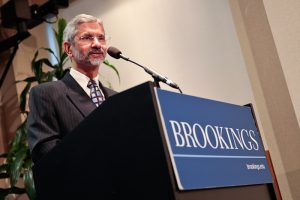Toward the end of last week, Indian External Affairs Minister S. Jaishankar delivered two characteristically frank and direct speeches that taken together, provide us with significant additional understanding of how India sees its relations with great powers evolving – and the assumptions driving them.
On January 27, virtually delivering a keynote address at an annual conference organized by the Institute for National Security Studies (INSS) in Israel, Jaishankar dwelt at length on the United States and the direction the new occupants of 1600 Pennsylvania Avenue are likely to take when it comes to both foreign and domestic policy. “Because globalization has impacted its economy so deeply, this is equally a foreign policy issue. Therefore, we have already heard President Biden stressing the necessity of formulating policies addressing the well-being of the American middle class” Jaishankar said, adding, “Similarly, his closest advisors have spoken of a new U.S. industrial strategy to address the distortions of the current trading system.”
“The concerns, in many ways, are perhaps more constant than the manner of their articulation. If there is a message for the world, it is to go beyond politics and recognize what are the real shifts in American thinking.”
Jaishankar’s message was clear: the Biden administration is likely to, when it comes to trade and other “intermestic” issues, follow a course that is likely to be congruent with Trump’s, though shorn of crude mercantilist rhetoric. Indeed, he is not the only one in New Delhi who has predicted such a trajectory for the United States. However, the significance of Jaishankar’s prognosis can only be understood in the context of India’s own turn toward what looks to many as autarky-light. The Indian government – since last summer – has sharply raised barriers to international trade, and now seeks to reorganize the Indian economy under the banner of a “self-reliant India” whose exports surge while imports diminish.
In the past, Jaishankar himself has vocally spoken out against perceived lopsidedness of the global trading arrangements and free trade, which have, apparently, left India with the short end of the stick – an argument contested by many Indian economic as well as political analysts.
But by drawing attention to a reorientation of the U.S. economy itself, his remarks at the INSS sound almost like he is seeking to frame India’s own positions on external economic engagement as part of a larger shift. As such, there is a hint of unstated defensiveness in Jaishankar’s remarks, even though he did not directly dwell on India’s self-reliance plans.
Jaishankar also spoke of a theme that has become increasingly common in his policy speeches, and one he expanded on in his book last year: of global “rebalancing,” a changing distribution of global power and the relative decline of Western countries and the rise of Asia. “No amount of wishful thinking can turn the clock back,” Jaishankar said of this change, leaving one to wonder whose “wishful thinking” he was referring to in the first place. (Was it the Trump administration’s, who spoke of the need to maintain U.S. primacy in the Indo-Pacific in a recently declassified strategy document? Or his own government’s, which considers itself a peer of China’s despite the manifest and growing power differential between the two?)
What was left unmentioned in Jaishankar’s remarks is equally telling: China was not mentioned by name even once. While this makes eminent diplomatic sense considering the venue – the China-Israel relationship has continued to remain strong – the end effect of dwelling on the U.S. at a great length while omitting any direct reference to China appeared odd. (Purists could go even farther and argue that a serving cabinet minister had no business discussing a third country’s future trajectory – whether that be the U.S. or China – even if it was by way of general remarks on global strategy.)
But China was the sole topic of Jaishankar’s remarks the next day at another conference – this time around manifestly explicable, given that the occasion was the 13th All India Conference of China Studies. Many have already noted the speech to carry tremendous symbolic weight as it publicly presented an honest appraisal of China-India relations, including an airing of grievances that have accumulated since 2016, when Beijing blocked India’s entry into the Nuclear Suppliers Group.
Referring to the ongoing military standoff in eastern Ladakh, Jaishankar noted in his keynote address at the January 28 Institute of Chinese Studies-organized conference: “Significantly, to date, we have yet to receive a credible explanation for the change in China’s stance or reasons for massing of troops in the border areas.”
“The issue before us is what the Chinese posture signals, how it evolves, and what implications it may have for the future of our ties,” he said.
As a way of sketching out a path for how China-India relations could be brought back on track, he suggested a framework based on “three mutuals” – “mutual respect, mutual sensitivity and mutual interests” and eight propositions. As Hindu’s Ananth Krishnan noted in his newsletter, this formulation, in the context of China, was far from being without symbolic import, reminiscent as it was of Chinese leader Xi Jinping’s “Four Comprehensives” and “Four Confidences” formulations.
However, despite such weighty ideation, Jaishankar’s China remarks were ultimately unsatisfying in the lack of concrete policy proposals. Instead, one was left with a theorist’s abstract prescriptions – and a general impression that despite Jaishankar’s refreshingly direct approach when it comes to articulating his government’s stance, a sense of shock when it came to the dramatic downturn in China-India relations beginning last May still persists in the Modi government.

































